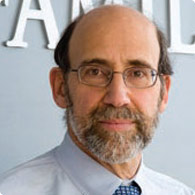Oral health advocate works to train rural communities, physicians

Research shows that dental caries, the scientific term for tooth decay and cavities, is the most common chronic disease of childhood and has potentially severe consequences if untreated. While oral health care access continues to be a critical issue within rural communities due to lack of insurance, distance to care and the scarcity of dental providers, advancements in the study of oral health have shown that infectious disease can serve as a predictor of adult oral health and general health. Adult gum disease, also known as periodontitis, is associated with tooth loss, diabetes and cardiovascular disease through inflammation. Alcohol and tobacco use increases the risk of oral cancer, which is commonly seen in rural residents who chew and smoke tobacco.
Talking with Dr. Mark Deutchman about the importance of oral health
Dr. Mark Deutchman, University of Colorado-Denver Department of Family Medicine & School of Dental Medicine associate dean for rural health and director of the School of Medicine’s rural track, has made a significant impact in highlighting the need for growth and advocacy for oral health in rural communities. NRHA spoke with Dr. Deutchman, an NRHA member and expert advisor for NRHA’s National Rural Oral Health Initiative, about his work in this effort.
“I became involved in oral health because of the role it plays in one’s overall health; it is important to address oral health at all ages, but it is especially important to be proactive in the early stages of life,” Dr. Deutchman explains. “As a family physician and researcher, I was interested in learning how primary care and oral health providers can work together to prevent caries in children and improve health outcomes for adults with oral health concerns.”
Dr. Deutchman admits there are many contributing factors to poor oral health that can be avoided by practicing proper oral hygiene, dietary habits and oral screenings: “Being aware of all these facts/factors and in my role as educator for the next generation of rural primary care physicians, I knew I wanted to take a more active role in the shared education and collaboration between primary care providers and oral health providers,” he says. “My involvement in oral health became more structured when the University of Colorado’s School of Dental Medicine received a grant from Delta Dental of Colorado to start Frontier Center to educate students on the importance of oral health care as well as inform dental students about diseases that have an impact on both oral and systemic health.” The subsequent Cavity Free at Three program works to train both medical and dental professionals to provide preventive oral health services to children and pregnant women.
Smiles for Life national oral health curriculum
From his role with these programs, Dr. Deutchman also became involved with the developers of the Smiles for Life oral health curriculum. Established in 2005, it’s a national oral health core curriculum that includes eight free, 50-minute modules that are easily accessible to individuals for continuing medical education (CMEs) credits. Along with fellow physicians, Dr. Deutchman has helped develop content for this national oral health curriculum, which has been endorsed by more than 16 professional organizations. Modules include:
- Relationship of oral and systemic health
- Child and adult oral health
- Dental emergencies
- Oral health for women in pregnancy and across life span
- Risk assessment
- Fluoride varnish and anticipatory guidance
- Oral examination
- Geriatric oral health
The curriculum has more than 55,000 registered users, 600,000 site visits and 139,000 completed online courses, and is used in more than 150 schools and training programs. Site visits have grown from 3,533 in 2010 to approximately 160,850 as of 2015. Furthermore, Smiles for Life provides resources, such as videos, risk assessment tools, interactive games, guidelines and Android/iOS apps, to provide additional avenues to gather information.
“It is critical for us to keep in mind the importance of oral health to overall health, access to care and dental services. As dentists are far and few in rural communities it is important for medical providers to take the time to do a quick oral examination for all patients,” Dr. Deutchman explained.
“I would encourage current or future rural primary care providers to become familiar with these techniques either through curriculum like Smiles for Life or other training material available to help prevent caries and/or improve rural oral health.”
Access oral health training
Now in its third edition, the Smiles for Life curriculum is the most widely used oral health curriculum in the country.
More information on how you, your students, or your staff can access and train with the Smiles for Life curriculum, is available at SmilesforLifeOralHealth.org.
For more information on rural oral health, visit NRHA’s Rural Oral Health Initiative page at ruralhealthweb.org/programs/rural-oral-health-initiative.
